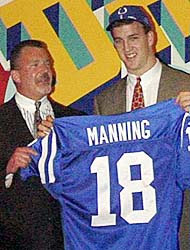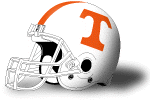

 |
 |
 |
|
INDIANAPOLIS (July 19, 1998) -- No sooner had the Indianapolis Colts used the first pick in the April draft on Peyton Manning than club president Bill Polian and coach Jim Mora made their feelings known. "We're going to throw him in there from the get-go," Polian said shortly after the Colts made the former University of Tennessee star the ninth quarterback to be selected first overall since 1970. Welcome to the NFL, Peyton. Here's your playbook. There's the field. Go get 'em, son. Like so many high-profile quarterbacks who have preceded him -- among them Denver's John Elway, Miami's Dan Marino, Dallas' Troy Aikman, New England's Drew Bledsoe, Pittsburgh's Terry Bradshaw, and Jeff George and Bert Jones with the Colts -- Manning's NFL baptism will come immediately. And with no guarantees. Mora knows that. Mora, then coach of the Saints, was on hand for the NFL debuts of Aikman in 1989 and Tampa Bay's Vinny Testaverde in '87. The Saints dominated Aikman, sacking him twice, intercepting him twice and depositing a 28-0 loss at his feet. They survived Testaverde, who threw for a then-rookie record 369 yards in a 44-34 New Orleans win. Mora's approach each time was intense. "You try to really mess 'em up," he said of planning against a rookie quarterback. "You try to take advantage of their inexperience and I'm sure people will try to take advantage of Peyton's." Several NFL talent scouts spent the days leading up to the draft praising Manning for his maturity, moxie and preparedness. How ready is the rookie? "He has exhibited everything you want to see," said Jerry Angelo, Tampa Bay's director of player personnel. "He's been in the limelight, in pressure situations, in big games." But not in the NFL. Players are bigger, stronger, faster. Defenses are more difficult to decipher. Offenses are more difficult to grasp. Aikman took lumps Ask Aikman. He has led Dallas to three Super Bowl titles, but paid some painful dues. His career-opening loss to Mora's Saints was the first in what would be a 1-15 season for the Cowboys and an 0-11 season for the former UCLA All-American. "It's tough for any young quarterback, regardless of what team you go and play for," said Aikman, whose rookie travails included 29 sacks, a broken left index finger that cost him five starts and twice as many interceptions (18) as touchdown passes (nine). "To come in and play well right away at quarterback is the hardest thing to do in sports. And if you're the first pick taken in the draft, more than likely you're going to be on a team that was not very good the year before." Of the nine quarterbacks drafted first overall since 1970, six were taken by teams that earned the first pick by posting the league's worst record the previous season. The year before Aikman's arrival, Dallas, like the '97 Colts, was an NFL-worst 3-13. "Shell-shocked" Jones, the No. 2 overall pick by the Baltimore Colts in 1973, eventually would lead his team to consecutive playoff appearances from 1975-77. But his rookie season consisted of one win in five starts and a 28.8 quarterback rating. "I started till I got shell-shocked," said Jones. "Hopefully (the current Colts) are better than we were because. ... I was kind of getting killed out there." Then there's Archie Manning, Peyton's father, who was the second overall pick by New Orleans in 1971. He satisfied already lofty expectations by leading the Saints to a 24-20 upset of the Rams in the season opener and was a modest 3-5-2 as a rookie starter. But Archie Manning spent his first NFL season climbing uphill. "We didn't have a great cast and injuries were happening all the time," said Archie Manning, whose initial progress was impaired when contract talks stalled, forcing him to miss the first three weeks of training camp. "I was the type of guy who wanted to play, but there was a big transition for me. "Back then, the game wasn't near as complex as it is now, but I still had so much to learn." Mistake with Elway Atlanta Falcons coach Dan Reeves understands that. In 1983, he was directing a Denver franchise that obtained its quarterback of the future (Elway) in a trade with the Colts. Reeves monitored Elway's progress throughout the preseason and was convinced his prized prospect was ready to open the regular season as the Broncos' starting QB. "It was a mistake," he said. The John Elway that started the 1983 campaign at Pittsburgh hardly resembled the one that led Denver to a Super Bowl win over Green Bay six months ago. Against the Steelers, a not-ready-for-prime-time Elway completed 1-of-8 passes for 14 yards with one interception before being replaced by Steve DeBerg. And as is the case with many rookie quarterbacks forced to operate with a weak supporting cast, Elway took his lumps. In three of his first four starts, he was knocked out of the game with injuries. Reeves said Elway's early struggles had little to do with the physical demands of the NFL. "It was the speed of the game," he said. "Everything happens so much quicker. I have always compared it to a student in Spanish class. You can have a guy who speaks the language fluently in class and can pass all the exams. But drop him off in the middle of Mexico where everybody speaks the language so fast and he's lost." The best since 1983? Conventional wisdom once held that it took five years for a quarterback to fully develop. Nowadays, teams that invest heavily in a marquee quarterback aren't as patient. Neither are the quarterbacks. Aikman put it this way: "Either go out there and play and take your medicine, or sit back and wait and watch. I don't think you learn unless you get out on the field and do it." Peyton Manning's thoughts exactly. "I think the sooner you take your bumps and bruises, the better off you're going to be in the long run," Manning said. "If you have a negative experience, it's up to you how you respond." Manning resisted the urge to enter the NFL after his junior season and left Tennessee after starting 45 games and throwing 1,381 passes. He's ready, he said, for his professional baptism by fire. "Experience is your best teacher, and I think I've done everything I could possibly do to prepare myself for this," he said. Supporting cast a factor Miami's Jimmy Johnson, who witnessed Aikman's tribulations in 1989 as Dallas' rookie head coach, said Manning and the Colts can avoid some challenges that traditionally confront a team starting a rookie quarterback. "I don't think there is any doubt they have an advantage over what we had in Dallas," Johnson said. "No. 1, we were horrible and (the Colts) have a decent supporting cast with that defense and with Marshall Faulk. No. 2, they've got an experienced head coach. It was all new to me. "I've watched Peyton the last couple of years, and I really like his chances. He's coming from an offensive system that was good for him. That, plus his background of being around Archie, will make his transition to the NFL better than anybody's in a long, long time." Maybe since 1983. That year, the Miami Dolphins used the 27th pick in the first round on Marino. He was the sixth quarterback selected, but the one who generally avoided the rookies-must-struggle rule. Coach Don Shula opened the season with veteran quarterback David Woodley, who led the Dolphins to the Super Bowl the previous season, but things soon changed. Shula made the switch after five games and Marino didn't disappoint. He posted a 7-2 record as a starter and directed the Dolphins into the playoffs. "I think a rookie can be ready, but you've got to control him," Shula said. "You can't put him in there and say, 'OK, win us a game,' like you could with a veteran quarterback. "But when a guy has skill and if you put enough good football players around him, you can hand-feed him and bring him along at the right pace. 3 "Peyton seems to be that kind of guy." |